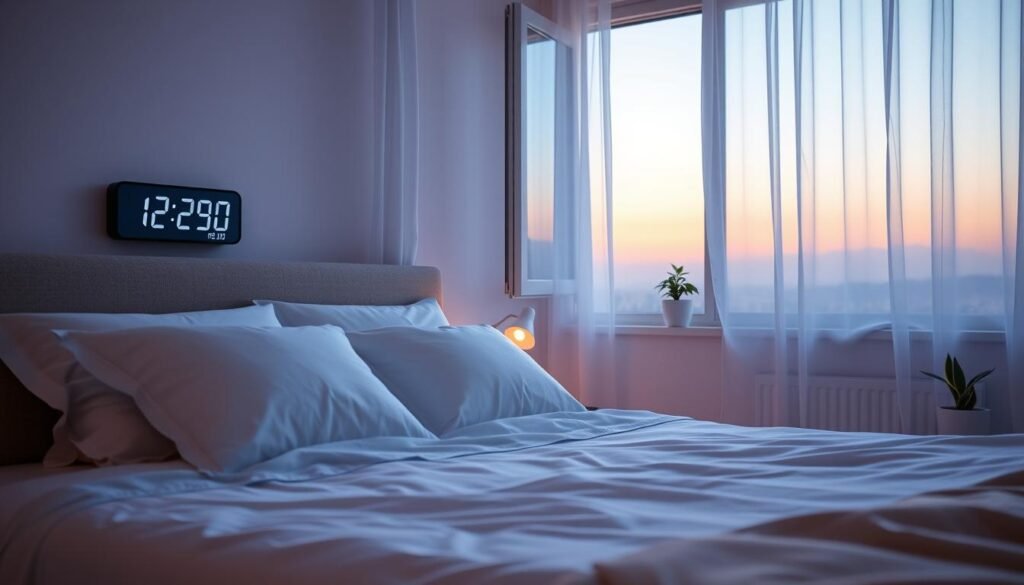Over 30% of adults struggle with sleep problems, such as changing sleep hours. This issue affects many people today. To stay healthy, adults need at least seven hours of sleep regularly. Yet, many sacrifice their sleep for various reasons, staying up late.
An irregular sleep schedule can make you feel tired, affect your mood, and lower productivity. Stress, too much screen time, and tough jobs make it worse. This article will show you how to improve your sleep hygiene, why a consistent bedtime is important, and ways to fix sleep disorders naturally.
To live a healthier life, it’s crucial to understand better sleep practices and our body’s clock. If you’re a night owl or work odd hours, don’t worry. There are effective methods to enjoy good sleep again.
Key Takeaways
- Irregular sleep schedules can significantly impact mental and physical health.
- Establishing a consistent sleep routine is essential for maintaining a healthy sleep cycle.
- Incorporating good sleep hygiene practices can help alleviate sleep disorders.
- Understanding the factors that disrupt sleep can empower individuals to make necessary changes.
- Natural remedies and relaxation techniques can be highly beneficial in restoring healthy sleep patterns.
Understanding Irregular Sleep Schedules
An irregular sleep schedule can really affect your health and happiness. It comes from not having set times for sleeping and waking up. Things like busy jobs, lifestyle choices, and using gadgets can mess up our sleep routine.
People with odd work hours or those who travel a lot might feel like they have irregular sleep-wake syndrome. This is rare and happens when someone’s brain can’t follow a daily pattern. To diagnose it, you have to have three weird sleep times in a day, spaced 1 to 4 hours apart.
Doctors might use tools like actigraphy or sleep diaries to figure out what’s going on with your sleep. To fix an irregular sleep schedule, you might try sticking to a daytime routine, cutting down on naps, trying bright light in the morning, and maybe using melatonin at night. Older people should be careful with melatonin, though.
Having a regular sleep routine is key for staying healthy. If your sleep is all over the place, seeing a doctor can help. Fixing your sleep can make life better and lower the chances of health problems.
| Symptoms of Irregular Sleep Schedule | Potential Causes | Recommended Actions |
|---|---|---|
| Frequent sleep disruptions | Shift work, traveling | Keep a sleep diary |
| Difficulty maintaining normal sleep patterns | Lack of structured routine | Practice good sleep hygiene |
| Daytime fatigue | Sleep deprivation, irregular timings | Consult a healthcare provider |
Why Is a Sleep Routine Important?
Having a regular sleep routine is key to good sleep and health. It sets your body’s clock, so you sleep and wake up smoothly. Keeping the same sleep time can cut down health problems a lot.
People who sleep at the same time every night face a 30% lower risk of dying from any cause. They also have a 38% lower risk of heart and metabolism diseases. College students with regular sleep times enjoy better sleep. This shows why sleep habits matter.
Not sleeping well affects how well you work. People who sleep 5 to 6 hours are 19% less productive. And those who sleep under 5 hours are 29% less productive. A regular sleep routine ensures you get the 7-9 hours needed for health and long life.
Following a steady bedtime routine has many perks:
- Improved mood
- Lower stress levels
- Healthier weight management
- Better immune system function
- Enhanced cognitive function
- Reduced risk of accidents
Unpredictable sleep schedules can lead to big health issues like high blood pressure, diabetes, and high cholesterol. A steady sleep routine can lessen these risks, helping you live healthier.
| Benefit | Impact of Consistent Sleep Routine | Impact of Inconsistent Sleep Routine |
|---|---|---|
| Mood | Improved | Heightened stress and anxiety |
| Productivity | Higher efficiency | Decreased performance |
| Health | Lowers disease risk | Increases risk of chronic illnesses |
| Immune Function | Strengthened | Weakened |
| Longevity | Lower mortality risk | Higher mortality risk |
A sleep routine boosts sleep quality and benefits your body and mind. It encourages you to care for your sleep, leading to a healthier life.
The Role of Circadian Rhythm in Sleep
The Circadian Rhythm is our body’s internal clock. It runs our 24-hour cycle of sleeping and being awake. The light outside tells our brain when to wake up or get ready for bed. When it’s light, our brain wakes us up. When it’s dark, it makes melatonin to prepare us for sleep. A steady Circadian Rhythm helps us stay mentally and physically healthy.
When our rhythm is off, we can have Sleep Disturbances. Older people often face these issues. As we age, our sleep and light exposure can change, leading to problems. Alzheimer’s disease makes this worse, causing more sleep issues.
Central nervous system disorders can mess up our sleep too. Things like brain injuries and mental health problems make Sleep Disturbances more likely. Older adults, especially those with Alzheimer’s, also get less sunlight. This means they might wake up more at night and have trouble sleeping properly.
Our Sleep Cycle is important for our health. It has stages that help with recovery and health. Slow-wave sleep, for instance, is key for tissue growth and fixing muscles. It also boosts our immune system. If our sleep cycle is constantly disrupted, our health can suffer a lot.
Factors That Disrupt Your Sleep Cycle
Many factors can mess up your Circadian Rhythm and make it hard to sleep well. Jet lag often troubles people who travel a lot. Changing time zones makes the body confused, causing sleep disturbances and more.
Shift work complicates things further. Switching between day and night shifts can really harm your sleep. It affects your health and how you function daily. Studies show that frequently changing work hours messes with sleep habits and circadian rhythms.
Too much screen time can also harm your sleep. The artificial light from devices makes the body think it’s still daytime, leading to sleep disturbances. Drinking a lot of caffeine is another problem. People might not notice, but caffeine makes it hard to fall and stay asleep.
Stress also affects how well you sleep. Being very stressed can make it hard to relax at night. This leads to sleep deprivation and choppy sleep patterns. Dealing with stress better can help you sleep much better.
| Factor | Impact on Sleep |
|---|---|
| Jet Lag | Causes difficulty adjusting to new time zones, leading to sleep disturbances |
| Shift Work | Leads to Circadian Rhythm Disruption and heightened sleep deprivation |
| Technology Usage | Artificial light triggers sleep disturbances by affecting melatonin production |
| Caffeine Intake | Reduces sleep quality and contributes to prolonged sleep deprivation |
| Emotional Stress | Prevents relaxation, leading to fragmented sleep and daytime drowsiness |

Consequences of Sleep Deprivation
Sleep deprivation can seriously harm both physical and mental health. It damages daily life and long-term happiness. In the U.S., around 50 to 70 million people deal with sleep disorders. These disorders cause a lot of sleep loss and hurt their quality of life.
Common signs include feeling very sleepy during the day and trouble starting or keeping sleep.
Not getting enough sleep can lead to scary health risks. Studies link it to more chances of getting illnesses like high blood pressure, obesity, diabetes, and heart diseases. It makes the immune system weak, making it hard to fight off sickness. Also, not sleeping enough can mess with hunger hormones, which might make you gain weight and struggle with eating habits.
Sleep shortage greatly harms how the mind works. People often face poor focus, forget things, and find decision-making hard. Emotional control also goes downhill, leading to anxiety, depression, and even seeing things that aren’t there in extreme cases. Those who don’t sleep enough for a long time might even think about suicide more.
Long studies show a clear link between how long you sleep and health problems. Sleeping 7 to 9 hours each night greatly lowers health risks. Good sleep habits can help avoid the bad effects of not sleeping enough. They can also keep serious sleep problems away.
| Health Risks | Conditions Associated |
|---|---|
| Hypertension | Increased blood pressure and strain on the heart |
| Obesity | Disruption of hormones affecting appetite |
| Diabetes | Insulin resistance due to reduced sleep |
| Cardiovascular Disease | Higher risk of heart attack or stroke |
| Mental Health | Increased anxiety, depression, and impulsivity |
How to Create a Consistent Sleep Schedule
To start a consistent sleep schedule, you need to change your daily habits a bit. Try moving your bedtime and wake-up time little by little, say 15 to 30 minutes. This helps your body’s internal clock to adjust. Having the same wake-up time every day, even on weekends, is key for a consistent sleep schedule.
A regular sleep routine means better health overall. Sleeping too little, under seven hours, harms your heart and metabolism. Stress and worry often lead to insomnia by making your mind race, making it hard to keep a steady schedule.

Avoid blue light from gadgets before going to sleep to maintain melatonin levels. Morning light exposure can reset your internal clock. If you travel a lot, give your body time to adjust to avoid jet lag. Adjusting to a new sleep time might take a week or two. Yet, some may feel better, with an improved mood and more energy, in just days.
Follow these steps to keep a steady sleep schedule:
- Choose a fixed bedtime and wake-up time that fits your life.
- Adjust your sleep time by 15 to 30 minutes gradually.
- Avoid screens at least an hour before bed.
- Get some natural light during the day, especially in the morning.
- Have a calming bedtime routine to enhance sleep hygiene.
Sticking to these steps will help you create a sleep routine that improves sleep quality over time.
Tips for Improving Sleep Hygiene
Improving your sleep hygiene is key for better sleep quality. A regular bedtime routine can help reduce problems like insomnia. It makes your sleep cycle more regular.
- Maintain a regular sleep schedule, going to bed and waking up at the same time each day.
- Optimize the bedroom environment—keep the room cool, dark, and quiet.
- Limit screen time at least one hour before bedtime to reduce exposure to blue light.
- Avoid heavy meals and too much caffeine before sleeping. Caffeine can make it harder to sleep.
- Get plenty of bright light during the day. It helps improve your sleep at night.
- Choose a comfortable mattress and pillow. Comfort is crucial for restful sleep.
- Short naps are okay if you’re very active or do a lot of physical work.
A disciplined sleep routine can greatly help with insomnia. Watching your caffeine and alcohol consumption is important. Drinking them late can mess with your sleep.
For more tips on sleep habits, look at these detailed sleep hygiene. They can give you more useful info.
Understanding what affects your sleep, like hormonal changes, can also help. This is especially true for women with period-related sleep issues. For more on how menstruation impacts sleep, see how to deal with period insomnia.
Natural Remedies for Sleep Cycle Disturbances
Sleep cycle disturbances can really affect your day. Natural remedies are good ways to tackle these problems. Valerian root and chamomile are famous for making you calm, which helps you sleep better.
Melatonin is another great option. It’s a hormone that tells your brain it’s time to sleep. A study in 2016 showed it helps people with insomnia sleep better. Using melatonin at the right time can make it even more effective.

Relaxing before bed can also make a big difference. Things like aromatherapy and warm baths can help. Using essentials oils, like lavender, can make your sleep space more soothing. A study in 2014 found that lavender oil can improve sleep and lower anxiety.
Exercise is key for good sleep too. A study in 2015 showed that exercising for 150 minutes a week helped reduce insomnia symptoms. Making exercise a regular thing can fight off sleep problems and lead to better sleep.
Adding these natural remedies to your nightly routine can make your sleep better. Making time to relax and using these natural options can help fix sleep cycle issues.
Effective Relaxation Techniques to Promote Sleep
Many people struggle to sleep because of insomnia. Using relaxation methods can greatly improve how well you sleep. Techniques like guided imagery, deep breathing, and gentle yoga reduce stress. This makes it easier to fall asleep.
These methods help calm both your mind and body. For example, deep breathing can turn on your body’s relaxation response. This makes you ready for sleep. Taking long, slow breaths helps calm you down, which is key to beating insomnia.
Mindfulness meditation is about staying in the now without judging. It helps with sleep by getting rid of bedtime worries. Using guided imagery, people imagine peaceful scenes. This helps create a calm mind.
Gentle yoga also helps with sleep. Over half of those who do yoga say they sleep better. Adding these techniques before bed can fight insomnia. They can make your overall health better. Learn more by checking out additional resources.
CBT, or cognitive behavioral therapy, makes relaxation tips work better. It deals with insomnia’s main causes. CBT adds changing lifestyle and better sleep settings to relaxation methods. Using these techniques regularly can greatly improve sleep for those with insomnia.
Trying different relaxation ways helps with better sleep. It means you wake up feeling ready for the day. Doing these often improves your mental health and wellness. This is vital for solving sleep problems.
Incorporating Exercise for Better Sleep Quality
Regular exercise is key to better sleep quality. Adults who get 30 minutes of activity daily sleep about 15 minutes longer. Those who don’t exercise don’t enjoy this benefit. For people with sleep disorders like insomnia, the impact is even greater. Simply working out for 30 minutes three times a week for eight weeks can make a big difference in sleep.
Working out at a moderate pace helps control your body temperature. It also increases melatonin, which we need for a good sleep cycle. Moreover, exercising helps lower stress. This makes it easier to fall and stay asleep. When you feel good from exercise, you’ll likely want to keep doing it. This positive cycle makes workouts more enjoyable.
It’s a two-way street between exercise and sleep quality. Poor sleep can make you less active the next day. But getting good sleep boosts your motivation to stay active. Interestingly, does it matter when you exercise? Some studies show yoga or light stretching at night can help you fall asleep faster and rest better.
| Benefits of Exercise on Sleep Quality | Details |
|---|---|
| Improved Sleep Duration | Adults engaging in 30 minutes of exercise reported sleep duration increases averaging 15 minutes. |
| Increased Melatonin Production | Regular physical activity boosts melatonin levels, regulating sleep-wake cycles effectively. |
| Stress Reduction | Exercise decreases stress levels, aiding in both falling asleep and staying asleep throughout the night. |
| Enhanced Mood | Active individuals exhibit higher levels of positive feelings, which can motivate further physical activity. |
| Potential Alleviation of Sleep Disorders | Moderate-intensity exercise can directly improve sleep quality and alleviate insomnia symptoms. |
| Better Sleep Onset | Evening physical activity has led participants to experience quicker sleep onset and improved sleep cycles. |
Exercise is not just about getting fit. A steady workout routine can greatly enhance sleep quality. This can even help folks struggling with sleep disorders.
Conclusion
It’s really important to fix an irregular sleep schedule to stay healthy. This is especially true for college students. Studies show that not sleeping well is linked to feeling worse, being more tired, and having trouble with daily tasks. Making an effort to sleep better can make you feel happier and more satisfied.
Setting a regular bedtime and having a relaxing routine before bed can help a lot. Trying natural remedies and relaxation methods can also improve sleep. This can create a good cycle of sleeping well, which helps with school and feeling emotionally better.
Improving sleep is not just about how long you sleep but also the quality and routine. By dealing with sleep issues and making changes, you can get healthier. This leads to a happier and more rewarding life. If you want to know more about sleep and well-being, check out this study.